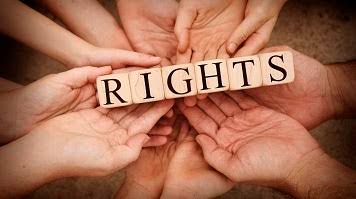“Now indeed, We have conferred dignity on the children of Adam.” (17:70)
وَلَقَدْ كَرَّمْنَا بَنِي آدَمَ
That is, every human being has been granted dignity by Allah as a human right. When Allah has given that right then taking that right away or restricting it is a crime against humanity.
However, throughout the ages the ruling elites usurped this human right of people and exploited and subjugated them for their own ulterior motives.
So, human beings forever have been in quest for real freedom. The Quran declares that the Prophet’s (SallAllahu Alayhi Wa Sallam) mission was to free human beings:
وَيَضَعُ عَنْهُمْ إِصْرَهُمْ وَالأَغْلاَلَ الَّتِي كَانَتْ عَلَيْهِمْ
(7:157) – “and lift from them their burdens and the shackles that were upon them [aforetime].”
The essence of freedom is that humans should not have sovereignty over humans. The Quran declares that during the period of الدِّينِ (Al-din):
وَالْأَمْرُ يَوْمَئِذٍ لِلَّهِ
(82:19) – “for on that Day [it will become manifest that] all sovereignty is God’s alone”.
This will be the period when everyone will see his deeds in front of him. Neither will anyone be able to do anything for the other; nor would one have any authority over the other. All power and authority will rest with Allah.
That is why the Quran says:
لَا يُشْرِكُ فِي حُكْمِهِ أَحَدًا
(18:26) – “He allots to no one a share in His rule!”
Allah says in the Quran that even His prophet (SallAllahu Alayhi Wa Sallam) did not have the authority to say to his followers to adopt his sovereignty instead of Allah’s (3:79).
What is يَوْمَ الدِّينِ (Yaumuddin)?
وَمَا أَدْرَاكَ مَا يَوْمُ الدِّينِ
(82:17) – “And what could make thee conceive what that Judgment Day will be?”
ثُمَّ مَا أَدْرَاكَ مَا يَوْمُ الدِّينِ
(82:18) – “And once again: What could make thee conceive what that Judgment Day will be?”
And what will be the unique attribute of this الدِّينِ (Al-din)?
يَوْمَ لَا تَمْلِكُ نَفْسٌ لِّنَفْسٍ شَيْئًا وَالْأَمْرُ يَوْمَئِذٍ لِلَّهِ
(82:19) – “[It will be] a Day when no human being shall be of the least avail to another human being: for on that Day [it will become manifest that] all sovereignty is God’s alone.”
This will be the Day when humanity will enjoy true freedom and no human will be able to dictate to another human directly or indirectly. All Sovereignty will be Allah’s alone. That is, all matters will be decided by the Book of Allah.
All authority and control today seems political. But the real authority resides in economic control. Through this economic control elites control the lives of masses. Thus the masses become completely dependent on the system devised by the rich and powerful.
But in the period of الدِّينِ (Al-din) all human authority will be annulled except Allah’s. In that period no human will have authority or control over other humans. Concerning this economic control, the Quran says:
وَيْلٌ لِّلْمُطَفِّفِينَ
(83:1) – “Woe to Al-Mutaffifin [those who give less in measure and weight (decrease the rights of others)].”
The Quran’s terminologies are very comprehensive. There are two significant terms the Quran has used for elites: One is مُتْرَفِينَ (Mutrafin) – those who lead comfortable and luxurious life at the expense of others; and the other is مُطَفِّفِين (Mutaffifin) – those who squeeze others, stifle their abilities, and do not let their latent potential to be developed and actualized. That is what the Quraysh were doing. And Prophet (PBUH) warned the Quraysh that their exploitation of human beings will lead to their downfall. What the Prophet (PBUH) told the Quraysh is a Universal Eternal Principle of politics. A society that exploits human beings will suffer downfall sooner or later as exemplified by the history of the destruction of past nations.
The Quran says that humans have this strange characteristic:
وَأَمَّا إِذَا مَا ابْتَلَاهُ فَقَدَرَ عَلَيْهِ رِزْقَهُ فَيَقُولُ رَبِّي أَهَانَنِ ; فَأَمَّا الْإِنسَانُ إِذَا مَا ابْتَلَاهُ رَبُّهُ فَأَكْرَمَهُ وَنَعَّمَهُ فَيَقُولُ رَبِّي أَكْرَمَنِ
(89:15-16) – “But as for man, whenever his Sustainer tries him by His generosity and by letting him enjoy a life of ease, he says, “My Sustainer has been [justly] generous towards me;” whereas, whenever He tries him by straitening his means of livelihood, he says, “My Sustainer has disgraced me!”
The fact is that when human beings turn away from the guidance of وحی (Wahi or Revelation) the Law of Requital disappears from their sight. They forget that any good or bad that happens is the result of individual or collective deeds. They forget that:
وَلَا تَحَاضُّونَ عَلَى طَعَامِ الْمِسْكِينِ ; كَلَّا بَل لَّا تُكْرِمُونَ الْيَتِيمَ
(89:17-18) – “Nay, but ye (for your part) honor not the orphan and urge not on the feeding of the poor.”

